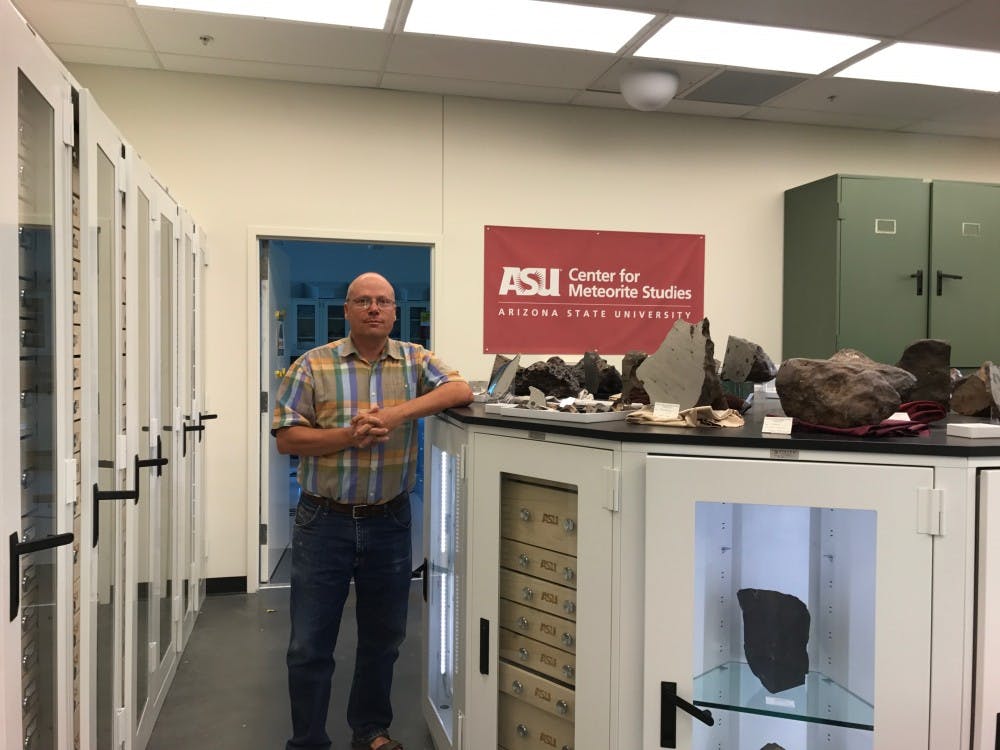Laurence Garvie studies meteorites for a living. He mans the “meteorite vault” at ASU, home to hundreds of meteorites, making it the largest university-owned collection in the world.
Similar to the Psyche mission, which will investigate planetary cores, Garvie has received funding from both NASA and the National Science Foundation.
He has a funded three-year proposal for his investigation of meteorite mineralogy to trace back to early solar system processes.
Garvie is a research professor at the School of Earth and Space Exploration and the curator at the Center for Meteorite Studies. He grew up in England and his father worked at NASA as a software engineer. Garvie received his undergraduate from the University of London and later got his doctorate from the University of Bristol.
An avid traveler, Garvie has studied and worked in Indonesia, New Guinea and Scotland, before settling down in Arizona.
He said he looked for a job “somewhere warm.”
Garvie now spends most of his days in the “meteorite vault,” where ASU stores its massive collection of meteorites. The vault has drawers on drawers and shelves on shelves of these dense celestial rocks. Garvie’s job is to curate these rocks, clean them up and study their physical components.
Of course, the rocks come from space, however, they land all over the world — some from Africa, some picked up locally in Phoenix.
When asked where he gathers these rocks, Garvie said people bring them to him. Aside from his meteorite “dealers,” Garvie obtains the rocks from regular people who turn them in.
Once the rock is turned in, Garvie can test to see if it is really a meteorite, and then the real work begins. In the meteorite studies lab there are microscopes and other machines that break the rocks apart so Garvie can study them.
With regards to his career goals, Garvie said, “Oh, I never had a goal — I just followed my passion as a scientist."
Although a lot of what Garvie does is independent work, Garvie works with students and the public often. In fact, he loves teaching people about the mysteries and science of space.
“I now realize it’s a fantastic way to engage the public in science because people love things that are extraterrestrial,” Garvie said.
He said that he enjoys speaking to the public about space, but it was something he had to grow accustomed to.
“There’s no point in being a scientist if you can’t explain it to your peers,” he said.
One of the reasons Garvie said he loves his job is the freedom he gets to have. He doesn’t work a regular 9 a.m. to 5 p.m. shift, instead Garvie’s work requires self-motivation and independence, which for some, might be difficult.
For Garvie, freedom allows him to pursue his multitude of passions. He called his research “particularly eclectic” because he has pursued several diverse scientific subjects already.
“I have a million research projects. I’ve got more research to do than I could ever do in a lifetime,” Garvie said.
He said that if there has been a difficulty for him in this line of work, it would be “trying not to take on too many interesting projects.”
Meenakshi Wadhwa, director of the Center for Meteorite Studies and Garvie’s supervisor for 10 years, wrote, “I can say that he has contributed significantly to the growth of the (meteorite) collection.”
Garvie said he also enjoys helping students with their scientific projects.
Alice Stephant, a post-doctoral researcher at the Center for Meteorite Studies who works with Garvie in the lab, said Garvie is the first person you have to go through at the beginning of any process.
“He’s very nice and very helpful, and he always has a lot of advice …. He’s one of the essential people of the lab,” Stephant said, adding Garvie always has time for students.
Garvie said he was never near the top of his class nor did he like school. In fact, he struggled to learn in a confined sort of setting.
He said his advice to ASU students is:
“You don’t have to have a 4.00 GPA or be the top of your class …. If you’re passionate about something, that’s what should drive you forward.”
Reach the reporter at cliddle2@asu.edu or follow @Crliddle on Twitter.
Like The State Press on Facebook and follow @statepress on Twitter.




